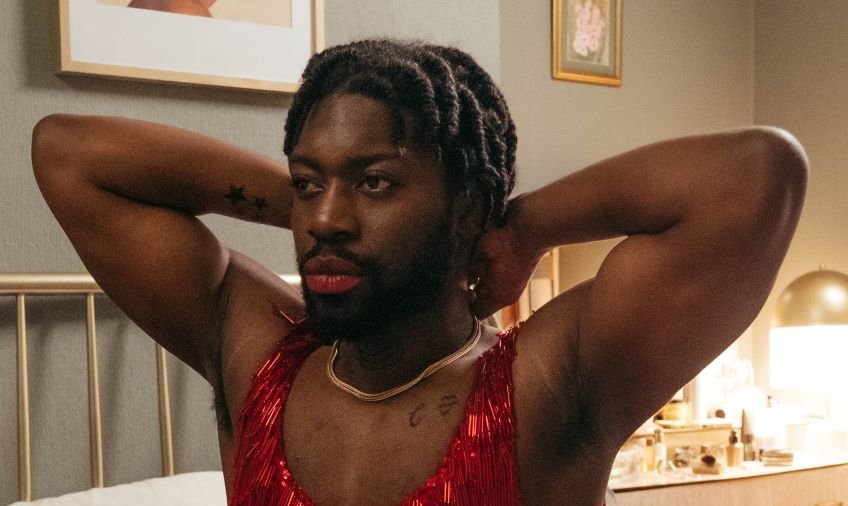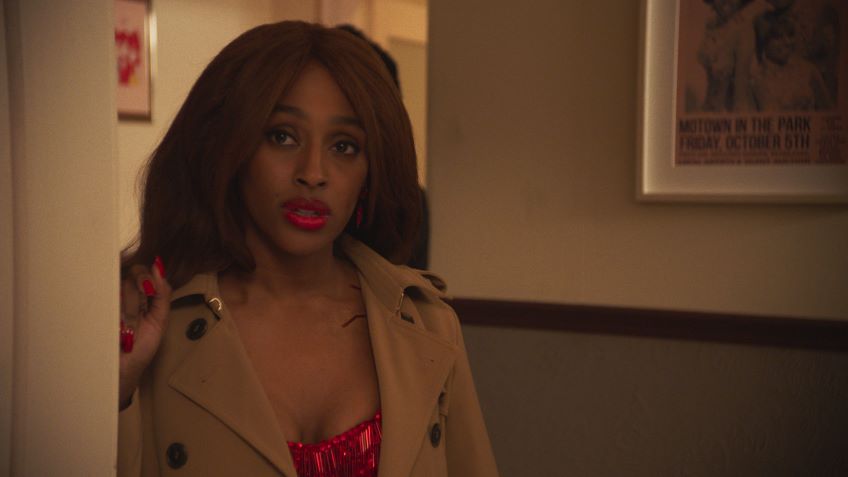Joyce Glasser reviews Pretty Red Dress (June 16, 2023) Cert 15, 110 mins. In Cinemas
Family life can get in the way of ambitions and dreams, even in a liberated, 21st century urban family, as breadwinner Candice (Alexandra Burke) discovers in writer-director Dionne Edward’s engaging and entertaining Pretty Red Dress. If the gender issues feel a bit dated, the film is made more topical by the sad death of Tina Turner whose music is central to Candice’s life.
Candice works in a supermarket by day and as the singer in a girl-band by night while waiting for her big break. She has also being waiting for her partner, former DJ and music entrepreneur Travis (Natey Jones), to be released from prison. And she is on constant standby for a call from the high school principal’s office announcing their teenage daughter Kenisha’s (Temilola Olatunbosun) latest act of aggression.
Just after collecting Travis from prison, Candice’s agent calls with news of the audition of a lifetime. Producers are looking for a singer with great legs and personality to play Tina Turner in new West End show.

If Candice was born to play Tina it’s not because Travis resembles Ike. On the contrary, love has survived his imprisonment, although Travis emerges with his pride battered and the only job on hand is washing dishes in his sententious older brother Clive’s (Rolan Bell) restaurant.
But if Travis’s career is going backwards, he wants Candice to fulfil her potential. This makes him a sympathetic liberated partner, but isn’t there just a teeny bit of jealousy?
When Candice picks out a sexy, red-sequined mini dress on the way home but cannot buy it until payday, Travis steps in (presumably getting an advance, although how he swings it is not clear). He takes the menial job at the restaurant and brings home the dress that will turn Candice into Tina and, Travis into an untapped part of himself.
We are as impressed as the show’s producers and director when Candice belts out River Deep, Mountain High. It looks like the part is hers for the taking.
The trouble is that Travis takes a fancy to the dress which he tries on with red lipstick. Candice is horrified when she returns early to see her hirsute partner in her dress, but he dismisses it as a bit of fun. While Candice is angry, she is also intrigued, and a little turned on.

Kenisha, however, who is caught making out with her best (girl)friend, is drawn closer to her father after the truth about both father and daughter gets out. Edwards draws a tender relationship based on humbleness, acceptance and honesty between father and daughter and the two find humour in their situations, a humour that unites them.
When Travis tries the dress on one time too many and rips it, Edwards presents Travis and Kenisha with a moral dilemma which is cleverly embedded in the story and in the characterisations. The rip is symbolic, but like the fabric of a family, it can be mended.
Meanwhile, the sibling rivalry between Travis and Clive reaches a climax at a birthday party Clive throws for their mother and a physical altercation ensues. If we never really understand the root cause of Travis’s anger management issues and his career stagnation, it seems Kenisha is destined for the same route.
The rather pat ending addresses Kenisha’s mental health issues, but not Travis’s anger management issues.
Edwards might feel she is breaking new ground by exploring sexual fluidity in the context of the Black macho culture where girls must be attractive to men in sexy, red skimpy dresses, and men should be virile. She has a point. Whether or not it’s new ground, after Julian Jarrold’s 2005 film Kinky Boots, and Barry Jenkins’ 2016 Moonlight, is another matter.
The subject is rich enough for two films and even for two stage musicals. What is essential to the film is that the cross dresser is likeable and for the most part, Travis, well played by Natey Jones, is. It’s just a shame that Edwards does not explore his sexuality in a wider context so that his interest in flashy clothes becomes part of who he is and is not a sudden passing fancy (like Kenisha’s sexuality) or a way of dealing with Candice’s success when he’s washing dishes.
Beyond having the courage to feature two relatively unknown actors (Jones and Olatunbosun) in her first feature, Edwards’ biggest achievement is giving us a family that manages to remain functional when it looks hopelessly dysfunctional. She is showing us people who fail and who disappoint themselves and others, but carry on without self pity, even if, as is the case of Travis, their pride gets the better of them once too often.




